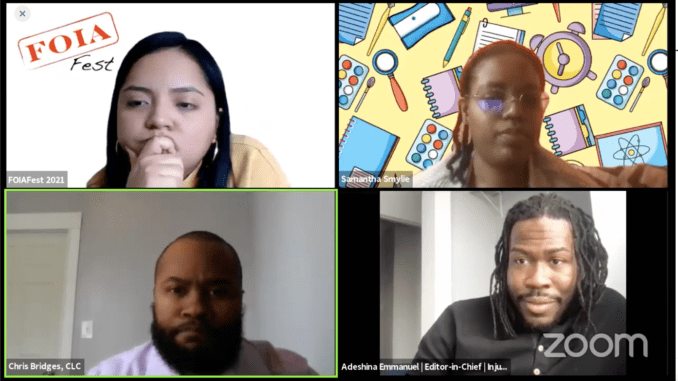
By Dyana Daniels
Adeshina Emmanuel understands that submitting a FOIA request isn’t just about getting data – it’s about the people behind those numbers.
“The only reason that we want to FOIA … is because of people – because there’s some impact or harm that we’re trying to understand,” said Emmanuel, editor in chief of Injustice Watch. “I think that’s like the North Star.”
Emmanuel was one of four panelists who discussed how to use the Freedom of Information Act to report on the education system this past weekend during the Chicago Headline Club’s FOIAFest 2021.
“Sometimes just building a relationship with the people that you’re trying to get information from is your easiest path to getting that information,” said Chris Bridges, education equity attorney for the Chicago Lawyers’ Committee for Civil Rights.
It may be jarring for school officials to receive a request, so it’s helpful if a reporter has already developed a rapport with education sources. Building on these relationships and being as specific as possible in a FOIA request was discussed as was how non-journalists may go about using FOIA.
“Definitely see what’s available,” said Samantha Smylie, state education reporter for Chalkbeat Chicago. “Even when you find certain information that’s available, see what’s missing.”
Checking Twitter is also a good tactic for finding information, Smylie said. She follows state government accounts on social media to see what they’re posting and uses that information to help her write FOIA requests.
When requesting information from school districts, it’s best to specify the school. Using the name the school uses on its report cards works best because it makes it more difficult for the school to avoid responding to the request.
“ I do not put, ‘I want to know this information about Chicago Public Schools,’” Smylie said. “I put, ‘I want to know this information about the city of Chicago School District 299’ because that’s what’s in their data set already.”
One thing to always remember is that families are involved and that should not be taken lightly.
“You have to be in a relationship with folks, you can’t just be swooping in to extract,” Emmanuel said. “You have folk’s vulnerability and everything that they’re suffering – oppressive systems. And I think it’s not to be treated cheaply.”

